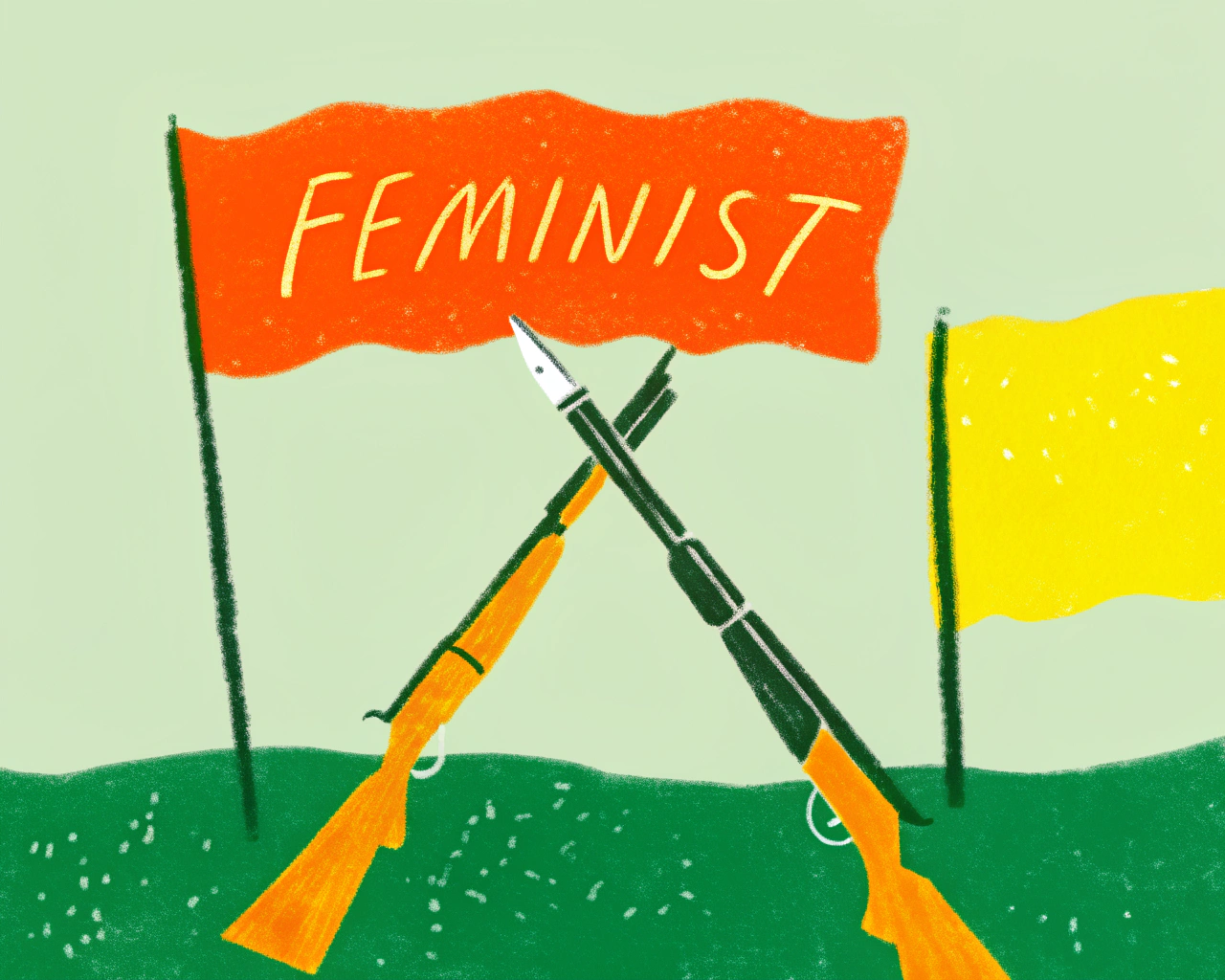Trigger Warning and Disclaimer: the content that you are about to read contains graphic and sensitive experiences. The opinions and opinions expressed in this piece solely reflect the author's views and not Andariya's. Reader discretion is advised. Read our full editorial notice here.
Introductory Remark
Upon close reading, I think the research paper “Gendered Frontlines: Feminist Readings of Militarization in Sudan, South Sudan, and Eritrea” offers a well-thought insight on the entanglements between militarization and gender in the Horn of Africa. The study demonstrates a feminist perspective that foregrounds lived experience, intersectionality, and historicized analysis. It exposes the way militarism is embedded in the everyday lives of women and marginalized communities in Sudan, South Sudan, and Eritrea.

What I found particularly informative is the way the paper manages to synthesize empirical inquiry with a critical investigation drawing on the insights of feminist thinkers like Cynthia Enloe, Amina Mama and Margo Okazawa-Rey (with the works of whom I was not familiar before), as well as situating militarization as a long-term historical and ideological process rather than a discrete and isolated political event.
The testimonies given by activists, journalists and displaced women, document a contextual presentation of how militarization becomes naturalized in institutional, cultural and intimate domains. While the paper’s interpretive framework is mostly situated within the terrain of feminist critical theory, particularly intersectionalism, it nonetheless opens space for engaging with broader traditions of post-structuralist and Lacanian thought. My reflections aim not to critique the paper in the conventional sense, but to engage with it from my philosophical background around the issues of gender discourse and the logic of militarization. The reflections that follow seek to enrich the paper by re-evaluating it with the discourse theory of Laclau, the psychoanalytic political theory of Lacan, and Foucault’s writings on discipline and biopolitics.
Reflections Regarding the Feminist Critical Discourse
The feminist critique articulated in the paper rightly centres on the ways in which militarized regimes in Sudan, South Sudan, and Eritrea have normalized gender hierarchies and used women’s bodies and narratives as instruments of nationalist, patriarchal authority. Through discourse and symbolic politics, the paper exposes how militarization assigns women limited roles either as symbolic markers of cultural identity, objects of protection, or as victims of conflict-related violence. However, while the paper rightly identifies the symbolic violence and material exclusions embedded in militarized gender norms, its analytic focus remains largely within a framework of unveiling and contesting ideological misrepresentation and it could benefit from a more nuanced account of how these norms acquire their affective and structural “grip” on subjects. Here, the discourse theory of Ernesto Laclau and the psychoanalytic insights of Jacques Lacan offer valuable resources for rethinking the nature of ideology, subjectivity, and identification in the context of feminist analysis.

From a Lacanian and Laclau’s standpoint, ideology is not simply a set of false beliefs imposed from above or a mask that distorts reality. Rather, ideology is what enables the very construction of reality for subjects. It provides the symbolic coordinates through which individuals come to understand themselves, others, and the world. In this sense, what is at stake in feminist critique is not merely the exposure of ideological misrepresentations about gender, but an interrogation of the discursive mechanisms that construct gendered subject positions as intelligible and desirable within militarized regimes of power.
Laclau’s conception of discourse as a field of contingency and antagonism helps reframe the political stakes of feminist struggle. Within a militarized context, discourses of masculinity and femininity are not natural givens but contingent articulations that have been sedimented over time through repeated social practices and institutional arrangements. The militarized woman as caregiver, as victim, as maternal nationalist, or in some cases as soldier is not simply a representation, but a nodal point in a discursive field that seeks to close meaning and stabilize identity.
Feminist critical discourse, then, must aim at revealing the contingency of these articulations and reopening the field of possibilities for new subject positions. On the other hand, Lacan offers the notion of the “subject” that reverses the conventional notion as a coherent, autonomous entity that pre-exists discourse or power. Rather, the subject is constituted in and through language and symbolic structures, which are themselves incomplete and fraught with antagonism. What marks the subject in Lacanian thought is its constitutive lack, a structural gap that arises from the very entry into the symbolic order. This lack is not a contingent misfortune but the very condition of subjectivity. It is the absence of a stable, fixed identity, and it is what propels desire: we desire because we lack, and we seek out symbolic identifications to temporarily veil that lack and offer a fantasy of wholeness.
Now, in the ideological field, particularly within militarized regimes such as those discussed in the paper, this fantasy of wholeness is often projected through the idealized figures of the soldier, the martyr, the motherland, the heroic male protector, or the self-sacrificing female caretaker. These images operate at the level of what Lacan calls the Imaginary, supported and overdetermined by a Symbolic order (laws, roles, institutions) that stabilizes identity through language and social roles. But these identifications, while powerful, are never fully satisfying. They always fall short of delivering the promised coherence or completeness.
This structural shortfall is what makes the subject vulnerable to the pull of ideology. Ideology, in this sense, is not a set of imposed false beliefs; it is the structure of fantasy that offers the subject a way to cope with the trauma of symbolic lack. It provides coordinates for desire. In the militarized societies described in the paper, ideology offers the subject the fantasy that by submitting to the nation, to the uniform, to gendered duty, they will overcome alienation and become whole. That is why subjects cling to positions of subordination even when such positions are oppressive because these positions are saturated with affective investment. The young boy conscripted into national service may despise the violence of militarism, yet still feel that his life “counts” only when he dons the uniform. Similarly, a woman mobilized as a nationalist symbol may resent her erasure but also fear her social invisibility if that role is denied.

Thus, feminist critique cannot remain at the level of exposing the falsity of militarized gender norms. The issue is not just epistemological (that people believe the wrong things about gender), but rather the militarized gender order offers an affective promise of fullness. To disrupt it requires the construction of alternative fantasies, alternative symbolic positions in which subjects can locate themselves affectively and politically. This brings us to Laclau’s political theory of hegemony and the central role of the chain of equivalence in political articulation.
Laclau, building on both Gramsci and Lacan, argues that politics emerges precisely from the impossibility of a fully sutured social order. No structure, no political regime, no identity, no ideology, can completely close the field of meaning. There is always excess, contradiction, and exclusion. This structural incompleteness opens up a space for antagonism: the moment where existing institutions and discourses fail to absorb demands, and where new political articulations become possible.
A chain of equivalence is Laclau’s name for the process by which different, dispersed, and even disparate social demands come to be linked together around a common signifier. These demands may originate from different struggles (against economic marginalization, against sexual violence, against racial exclusion, against ecological destruction) but through political articulation, they can be formulated as symptoms of a broader structural injustice. The function of the chain is to convert difference into unity, not by erasing difference, but by subordinating it to a common political project.
In the context of militarized gender regimes, feminist movements must ask: how can the struggle against patriarchal militarization be articulated not only as a women’s issue, but as a universal democratic demand? This is a question of alliance in the sense of a hegemonic operation. It means constructing a “people” where none existed, unifying fragmented subjectivities into a collective political will. Importantly, Laclau stresses that such chains are always contingent and fragile. They are not natural; they must be articulated, constructed through discourse and struggle. The signifier around which the chain coalesces, the “empty signifier”, need not have intrinsic content; what matters is its ability to gather disparate demands into a shared horizon of meaning. In feminist terms, this could be a concept like “liberation,” “dignity,” or “life.” The paper's concluding call for a reimagining of security “beyond militarization” gestures toward such a horizon, but the task remains to materially articulate what that means in concrete political terms, across different struggles.
To return to the paper, the task is not merely to oppose militarized masculinity or deconstruct the instrumentalization of femininity, but to produce a counter-hegemonic discourse; a new symbolic field where the feminist rejection of militarization is positioned as part of a broader struggle for life, justice, and democracy that contest the entire structure in which militarization appears necessary or inevitable. In such a field, the figure of the resistant woman (the protester, the caregiver, the dissident, the refugee, the activist) can become the new political subject around which equivalence is built.
A feminist critique must not only analyse how militarization reproduces gendered subordination and does not involve simply inserting women into national security apparatuses or advocating for female inclusion in peace negotiations, important though those goals may be. Rather, it demands a dislocation of the symbolic field itself: a shift in the terms through which subjects understand themselves, their desires, and their futures.
Reflections Concerning Militarization as a Regime of Disciplinary Power and Biopolitical Control
I agree with the paper in its exposition of how militarization is not only a condition of war, but a structure of everyday life. It elucidates how gender, violence, nationalism, and security intersect to produce profoundly unequal and often brutal social realities for women and other marginalized groups across Sudan, South Sudan, and Eritrea. However, while the paper explores the institutional configurations of militarism, it could be further enriched by a more intensive engagement with Foucault’s theories of disciplinary power and biopolitics. These concepts allow us to reconceptualise militarization not merely as a masculinist ideological apparatus or a militarist institution, but as a rationality of governance as a pervasive mode of organizing bodies, behaviours and populations.
In his genealogy of modern power, Foucault draws a crucial distinction between sovereign power, disciplinary power, and biopolitics. Under classical sovereignty, power functioned primarily as the right of the ruler to take life or let live. That is to say, power was expressed through spectacular violence, direct command and juridical authority. However, beginning in the eighteenth century and accelerating with modernity, power began to operate differently: it no longer relied on direct repression or the threat of death, but on the production of life. That is, power began to concern itself with the body and its capacities not in order to destroy, but to optimize, manage and regulate.
Disciplinary power, for Foucault, is the first modality of this new power. It targets the individual body: it seeks to render it docile yet productive, obedient yet capable. Discipline operates through institutions like the military barracks, the school, the prison and the hospital. It functions through surveillance, normalization, examination and continuous training. What is crucial here is that discipline does not operate by brutal force alone. Rather, it internalizes control; it incites the subject to self-regulate, to conform through habituation, desire and the reproduction of norms. The military is the paradigmatic institution of this logic. The body of the soldier is moulded, calibrated and positioned. Its gestures, posture, gaze and endurance are all subject to regimes of training. But this is not limited to soldiers. The logic of discipline (order, repetition, surveillance, submission) extends into civilian life. In militarized societies like Eritrea or South Sudan, the school, the neighbourhood, the refugee camp and the family become micro-sites of discipline, extending military rationalities into the civil sphere.
However, disciplinary power alone cannot account for the population-level techniques that characterize modern regimes. This is where biopolitics comes in. If discipline individualizes, biopolitics totalizes. Biopolitics is the rationality through which the state comes to manage the life of the species: birth and death rates, disease control, hygiene, fertility, nutrition, mobility, and more. It treats the population not as a juridical subject but as a biological entity, something to be optimized for productivity, longevity and order. Biopolitical power operates through statistical analysis, risk calculation, demographic planning and policy design. The subjects of biopolitics are, therefore, “biological lives”, bodies to be preserved, multiplied, or, in some cases, sacrificed.

The convergence of disciplinary and biopolitical power is precisely what gives militarization its peculiar form in the states examined in the paper. In these contexts, war is not simply a matter of sovereign decision or military conflict. Rather, militarization functions as a biopolitical apparatus: it disciplines bodies at the micro level, while regulating populations at the macro level. This dual logic is evident in the case of Eritrea’s national service program, which subjects both male and female citizens to indefinite military conscription.
On the surface, this may appear as a disciplinary regime. But when viewed through a biopolitical lens, it becomes clear that this is also a project of population engineering: the state moulds the entire life cycle of its citizens deciding when they work, where they live, what knowledge they are exposed to and what futures they can imagine. Here, Foucault’s insight that “modern power is no longer the right to take life, but the power to make live and let die” becomes particularly important. War, in the age of biopolitics, is waged not in the name of conquest or sovereignty alone, but in the name of life itself: to protect, secure and preserve the population. The paradox, as Foucault notes, is that the more regimes invest in the management of life, the more they generate new thresholds of death. Entire groups may be rendered disposable in the name of national security, racial purity, religious order, or demographic control. This is why, in biopolitical war, massacres become vital: populations are exterminated not as enemies of the sovereign, but as threats to the biological health of the nation.
In this sense, disciplinary power does not differentiate male and female bodies for the purposes of their oppression; it differentiates them only insofar as it can make them docile, functional and governable. The question, then, is not merely about gender roles in militarized systems, but about the broader transformation of social life into a military machine where society itself is imagined as a regimented and governable organism. The feminist critique of militarization cannot remain confined to representation, access, or equality. It must interrogate the underlying governmental rationality that turns life itself into an object of war. A feminist politics that challenges militarization must therefore also challenge the very logic of power that makes populations governable, bodies programmable and war thinkable as a technique of peace.
What, then, is the feminist counter-strategy? It cannot lie in the simple reversal of gender roles (e.g., inclusion of women in the military) or in formal calls for demilitarization devoid of structural critique. Rather, it must begin by denaturalizing the militarized rationality that binds together discipline, surveillance and life. This means questioning how peace is framed as security, how care is weaponized as nationalism, and how the regulation of life is always accompanied by the abandonment of certain lives to precarity and death. The task, in other words, is not just to demilitarize institutions but to de-militarize the political imagination. The feminist struggle against militarization, then, must be as generative as it is critical. It must invent new ways of being, relating, and organizing life that resist both the disciplinary grid and the biopolitical calculus. It must reclaim life not as something to be managed or defended, but as something to be lived otherwise.
Read the full report here and follow our social media pages (@AndariyaMag) to browse more content about this topic.
